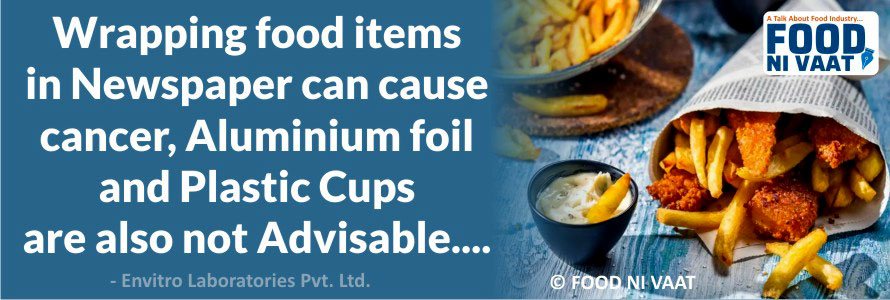

We all Indians have always passionate to bring hot and fresh street foods by wrapping in newspapers. In Gujarati peoples we have frequent needs of mouth watering FAFDA, JALEBI and Bhajiya*in packing of Newspapers. But this habit may become serious matter. Food wrapped in newspaper is dangerous. The real fun of eating on the street is to share the same paper plate filled with deep fried snacks with friends and dipping pakoras and samosas in the paper plate overflowing with chutney. While we all love doing this, we are not aware of the fact that such paper plates are a free invitation to various health issues. Read this piece of information to know more about it and how it can be controlled.
Wrapping food in newspaper is bad.
In Chennai, the Commissioner of Food Safety has issued a press release that prohibits storage, distribution and sale of food items packaged in printed newspaper, plastic or any other material. The release strictly prohibits the use of such material by eateries, as they cause health issues due to chemical and microbiological contamination. The release said that eatables such as vada, bonda, pakoda, bajji, cooked fish, meat items when packed in newspapers and plastic covers become toxic and should not be consumed for obvious reason.
What FSSAI says?
According to recent release issued by the Food Safety and Standards Authority of India (FSSAI) the printing ink contains cancer-causing agents that can cause severe health issues. Once warm food is placed under newspaper, the printed ink melts and exposes the human body to various health problems.
Even aluminium foil is bad :
According to experts; food wrapped in aluminium foil has more illness-causing bacteria. Bacteria like Staph and Bacillus Cereus which cause foodborne illnesses, actually produce toxins when heated and more importantly, they don’t get destroyed. When you cover the food with aluminium foil, it doesn’t seal your food properly and these bacteria get constant air to grow faster.
Plastic Bags and Cups are also very harmful if hot Tea, coffee or any other hot drinks served in it.
Are you used to going to your office’s canteen for drinking tea/coffee? Are you served Tea/Coffee in Plastic/Thermocol cups in your office, hospitals, etc.? Aren’t Plastic and Thermocol cups the favorites of parents and picnic-goers the world over? Should this worry you? Certainly, new research suggests that drinking hot tea/coffee in plastic cups could actually be harmful to health. It could lead to serious health ailments like liver and kidney diseases or even cancer. Are you regularly drinking your tea/coffee in Plastic/Thermocol cups? After reading this you might not!
Plastic? What is it?
Plastics surround us. A vital manufacturing ingredient for nearly every existing industry is Plastic. This material appears in a high percentage of the products we use every day. Although modern life would be hard to imagine without this versatile chemistry, products composed of plastics also have a dark side.
Substances are often added to plastic to help shape or stabilize it. Two of these plasticizers are:
Bisphenol-A (BPA), added to make clear, hard plastic
Phthalates, added to make plastic soft and flexible
What does the research say about Plastics?
BPA is a basic building block of polycarbonate plastics, used for bottled water, food packaging and other items. While it has been considered harmless in the form of a heavily cross-linked polymer, its bonds can break down over time, when plastics are repeatedly washed, exposed to heat or other stresses, liberating the building blocks of the chemical, which are toxic. When food is wrapped in plastic Or placed in a plastic container and microwaved, BPA and phthalates may leak into the food.
The amount of dangerous bisphenol A (BPA) that leaches from hot plastic bottles into the drinks they contain is most dependent on the liquid‘s temperature, according to a new research. When both new and used polycarbonate drinking bottles were exposed to boiling hot water, BPA was released 55 times more rapidly.
So, what can plastic do to me?
So, using plastic containers for having hot beverages can cause various diseases. The plastic containers are manufactured using various chemicals that could prove hazardous to health leading to various health ailments.
According to various tests conducted so far, this compound has been proved cancerous.
Some of the adverse effects from BPA exposure include:
1. Structural damage to the brain
2. Hyperactivity, increased aggressiveness, and impaired learning
3. Increased fat formation and risk of obesity
4. Altered immune function
5. Early puberty,
6. Stimulation of mammary gland development,
7. Disrupted reproductive cycles,
8. Ovarian dysfunction,
9. Changes in gender-specific behaviour, and abnormal sexual behaviour
10. Stimulation of prostate cancer cells
11. Increased prostate size, and decreased sperm production
Bisphenol-A is harmful for children as well as pregnant women. It can lead to breast cancer in women and can also become a reason for miscarriages. It can affect fertility in males as well. According to experts, Bisphenol-A also affects Alfa cell which produces insulin in pancreas. Insulin controls glucose levels in our body. The chemical also influences the level of hormones in our body. Also, it can cause lack of concentration in children.
What’s the solution?
It is advisable to serve food in stainless steel, dry leaves, or glass vessel to keep it free from germs and bacteria. Avoid Drinking Tea, Coffee or any hot drinks filled in plastic bags and served in plastic disposable cups. In case any street vendor sells food in newspaper there are official WhatsApp numbers on which people can lodge a complaint.
चाय पीने के लिए मिट्टी के कुल्लड एवं लस्सी,छाछ पीने के लिए मिट्टी के ग्लास को उपयोग में लाना चाहिए।